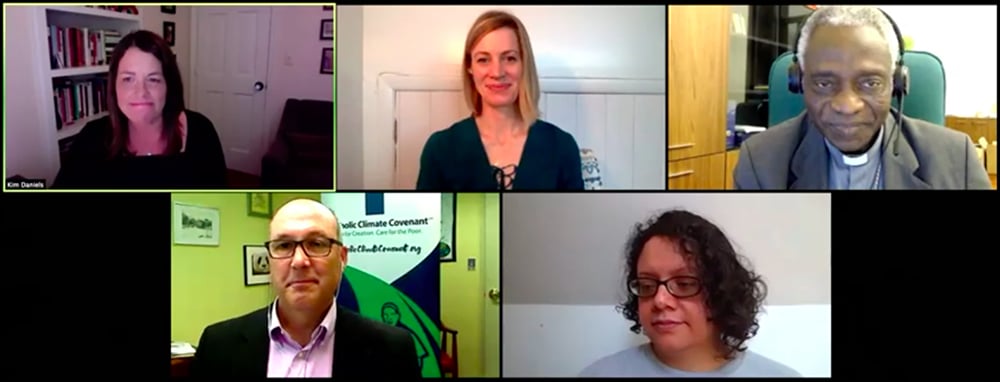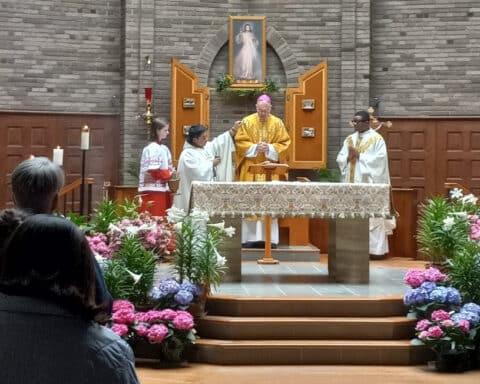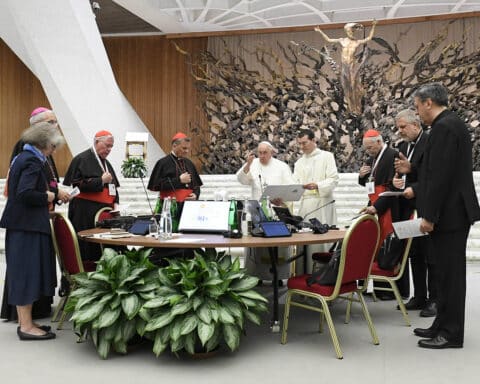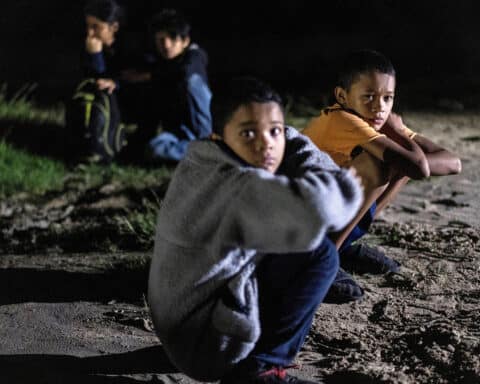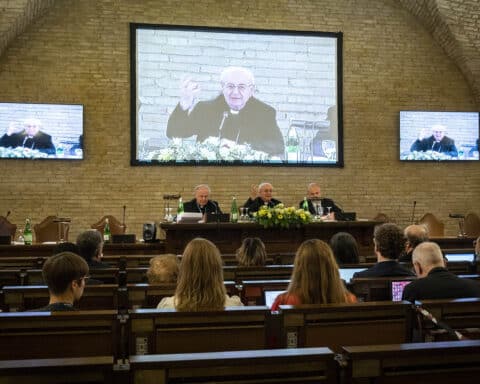Five years after Pope Francis wrote Laudato si’ (“On Care for Our Common Home”), Catholic experts in a recent panel discussion pointed out that the earth’s climate is still warming, a pandemic is ravaging the globe and powerful business interests continue to exploit the environment, extracting natural resources at the expense of vulnerable communities in developing countries.
But amid those continuing injustices and tragedies that now include racial unrest across the country, the pope’s 2015 encyclical on integral ecology is inspiring a growing number of Catholics to learn how preventing exploitation of the environment is connected to defending human life and dignity.
“Laudato si’ is an invitation to recognize we need to come together to create an environment in which nature and human beings will thrive,” Cardinal Peter Turkson said during a virtual panel discussion Friday sponsored by the Vatican and Georgetown University’s Initiative on Catholic Social Thought and Public Life.
Where all life thrives
Cardinal Turkson, who heads the Vatican’s Dicastery for Promoting Integral Human Development and is a key adviser to Pope Francis, described ecology as “a set of conditions” that constitutes an environment where everything in that ecosystem has what it needs to thrive. In nature, that translates to protecting rivers and lakes from polluting factories and the air from coal-burning power plants.
But ecology also pertains to the circumstances in which people live and whether they have what they need to thrive and lead dignified lives. Cardinal Turkson highlighted the protests over the past week in Minneapolis, sparked by the video of a white police officer who was recorded kneeling on the neck of George Floyd, an unarmed black man who subsequently died.
“What is that?” said the cardinal, who added that the unrest, rooted in frustrations over systemic racism and police brutality, is “a cry for people to recognize that every human being requires a certain minimum of social conditions to enable him to live and live successfully.”
Said Cardinal Turkson, “That’s what social ecology is all about.”
‘Beset by pandemics’
During the hourlong discussion, the cardinal and other panelists highlighted how Pope Francis’ emphasis on integral ecology is in continuity with and builds upon the teachings of popes Paul VI, John Paul II and Benedict XVI, all of whom wrote about caring for creation and respecting the ecology of the human person and society.
“What is really new about Laudato si’ is that it intertwines and links those prior threads to create an amplification that almost makes it a difference in kind,” said Christiana Zenner, an associate professor of theology, science, and ethics at Fordham University.
In the encyclical, Zenner said there is also a “centralization of ecological questions,” with ecology understood as having social, moral, environmental and economic dimensions. She noted that the U.S. bishops held their first news conference on Laudato si’ one day after an armed white supremacist in June 2015 targeted and killed nine black churchgoers during a Bible study in Charleston, South Carolina.
Said Zenner: “We are beset by pandemics which are social, racial, gun-mediated. We are beset by pandemics of economic inequality, and we are beset by pandemics which are viral in nature, really bringing truth to the point that we are all connected.”
At the grassroots level, Laudato si’ inspired residents in Chicago’s Little Village neighborhood who have been fighting for years to protect their community from air pollution, said Kim Wasserman, executive director of the Little Village Environmental Justice Organization.
Wasserman said she was surprised to hear folks in the inner city “talking about the encyclical and saying, ‘Wow, the things we’ve said, things we believe in, are all being lifted up here,'” said Wasserman, whose organization fought successfully in 2012 to close two coal power plants that degraded the neighborhood’s air quality and contributed to high asthma rates among residents.
A Church that leads
Dan Misleh, the founder of the Catholic Climate Covenant, who has been a leader in carrying out Laudato si’ in the United States, said the encyclical spurred several diocesan and Catholic agencies to step up their advocacy and lobbying on behalf of caring for creation. At the parish level, Misleh said there are now 500 “creation care teams,” up from about 100 before Laudato si’.
“Experts have noted for decades that the climate crisis is upon us and needs to be addressed. It’s a slow-moving pandemic but a pandemic nonetheless,” said Misleh, adding that climate change is impacting the poor “first and the hardest.”
This year, the Catholic Climate Covenant partnered with Catholic Charities in Washington D.C., to create a two-megawatt solar-based energy system that is expected to save the agency hundreds of thousands of dollars a year. Misleh said projects like that and the 400 solar panels that Catholic Climate Covenant recently helped to install on Immaculate Conception Church in Hampton, Virginia, provide “a great witness” to the wider community.
“Our young people are looking for our Church to lead on this,” Misleh said. “If we want our young people to come back to the Church, we have to at least have something along the lines of creation care. This is an issue they care deeply about, and we should tap into their enthusiasm and energy and be a witness to them, and I think that’s really important moving forward.”
The panelists also looked ahead to what the world could look like after the coronavirus pandemic, which they said should challenge humanity to examine its global economic model and ways of everyday living. Many noted that the air quality in several countries has actually improved because the shutdowns have reduced fossil fuel emissions.
Said Zenner, “I do hope our modes of connectivity, digitally and in person, and the slowing down of time many of us are experiencing right now can be a way to reflect on those relationships, what sustains, what is needed to live a dignified human life.”
Brian Fraga is a contributing editor for Our Sunday Visitor.

